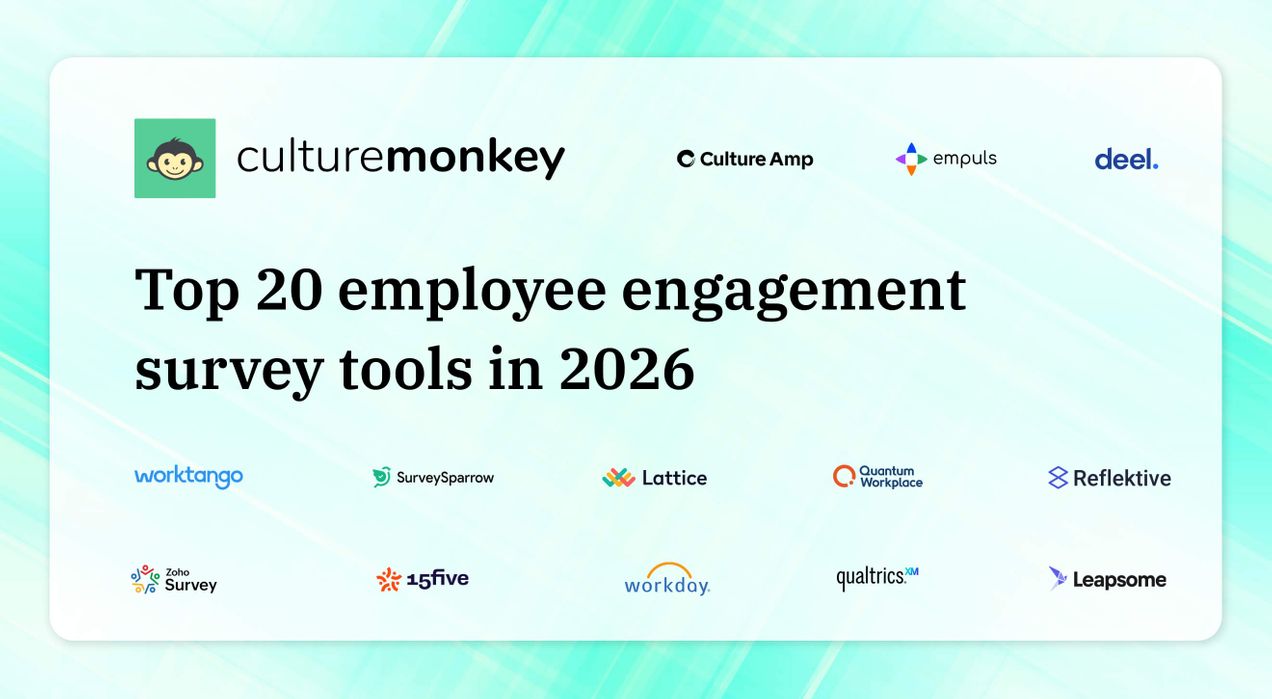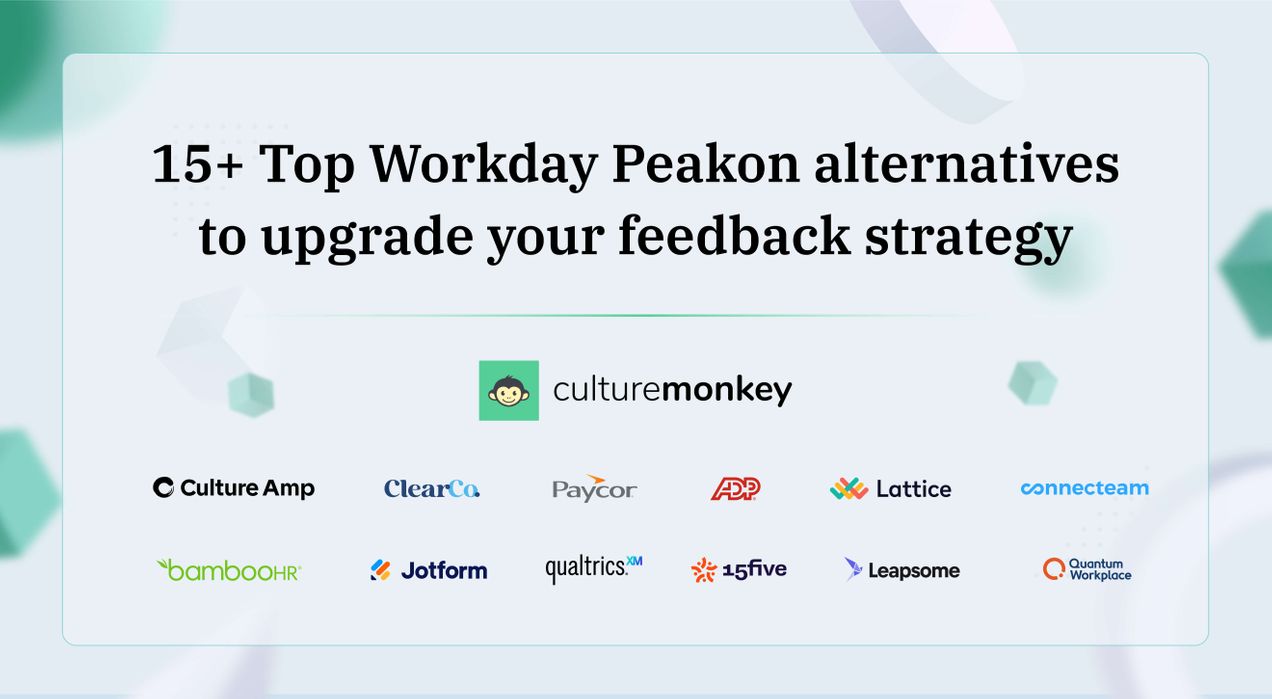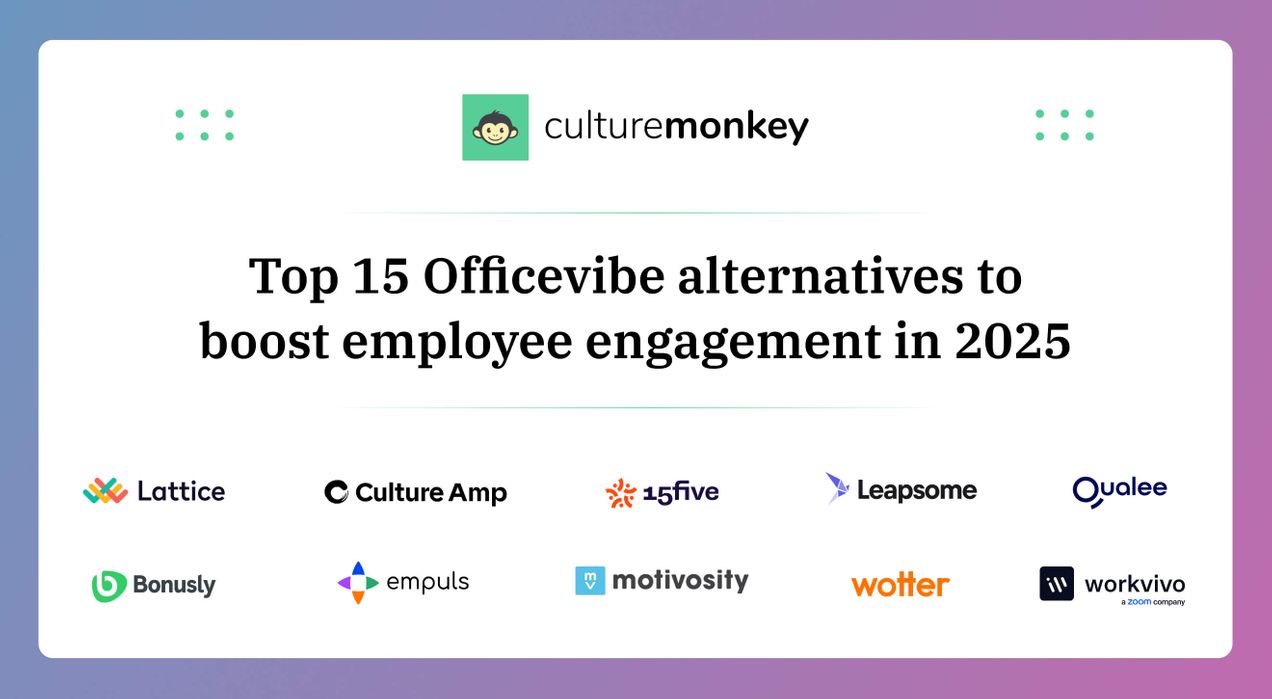What employee engagement survey consultants do and when to hire one

Sherlock Holmes never solved a case by accepting things at face value. He observed the smallest details others missed, asked the right questions, and pieced together clues to reveal the bigger picture—often hidden in plain sight. His brilliance wasn’t just in what he saw, but in how he interpreted it.
That’s precisely what an employee engagement survey consultant brings to your organization. They’re your workplace Sherlock—analyzing patterns in feedback, uncovering subtle signals of disengagement, and helping you connect the dots between culture, performance, and retention.
While surveys collect the data, it’s the consultant who reveals the story behind the numbers—so you can act with clarity, not guesswork.
TL;DR
What does an employee engagement survey consultant do?

TL;DR
Consultants diagnose root causes behind disengagement by analyzing patterns and removing internal bias. They design research-backed surveys, craft tailored rollout plans, and translate complex data into actionable insights that leadership can trust.
They don’t stop at reporting — consultants coach leaders, build buy-in, and create long-term engagement roadmaps to embed feedback loops and proactive culture improvement strategies.
Most companies can send out a survey, interpret it, and drive change. That’s where the magic (and the mess) begins. Employee engagement survey consultants step in as strategic partners—not just to run a survey, but to make it actually mean something and drive meaningful change.
Here’s what they really do: they ensure that the process is data-driven and meaningful.
- Diagnose what’s actually wrong, not just what people say: Consultants go beyond surface-level complaints. They look for patterns in feedback, assess historical context, and identify root causes that internal teams often miss due to bias or blind spots.
- Design surveys that actually work: Forget vague questions like “Do you feel valued?” A consultant customizes your survey using research-backed methods that align with your goals, turning it into a workplace survey strategy instead of a box-ticking exercise.
- Boost participation with tailored rollout plans: Low response rates? Consultants help you craft compelling communications and optimal timing strategies that drive engagement. Think of it as the difference between a “meh” email and a “Where’s that survey?” buzz.
- Turn messy data into decision-ready insights: Employee feedback consultants are trained to translate complex results into bite-sized, business-ready insights. They create narratives from numbers and recommend clear, contextual next steps.
- Guide leadership on what to do next: Consultants don’t just hand over a report and ghost. They coach leaders, present findings, and drive buy-in for action, ensuring that the feedback leads to real change, not just slide decks.
- Build a long-term engagement roadmap: Beyond the survey, they help embed engagement into your ongoing operations. From regular expert-led engagement surveys to feedback loops, consultants help your team move from reactive to proactive.
Why do companies work with engagement consultants instead of DIY tools?

TL;DR
DIY platforms offer templates and dashboards but lack context and psychological safety, often leading to irrelevant or filtered responses. Consultants customize surveys to your culture, ensuring honest, actionable feedback and saving HR time.
Unlike tools, consultants bring strategy, help align leadership, and evolve your engagement efforts with organizational growth, eliminating guesswork and administrative burden.
Let’s be honest, DIY survey platforms are everywhere. Easy to launch, full of colorful dashboards, and hey, they’re cost-effective too. So why are more companies choosing employee engagement survey consultants instead of going the DIY route?
Because when employee satisfaction and engagement are mission-critical for increased productivity, "plug and play" isn’t always enough.
- DIY platforms don’t ask the right questions for your context: Most tools offer templated questions. But what if your company just went through a reorg? Or you're facing high attrition in one region? HR engagement consulting services tailor questions to your unique context, making feedback relevant and actionable.
- Internal bias can blur the picture: Employees may filter their responses if they feel HR is watching. An external consultant offers anonymity and psychological safety, which boosts honesty and improves the quality of your workplace survey strategy.
- Consultants offer strategic support, not just software: While a tool shows you what’s happening, a consultant helps you understand why—and what to do about it. That’s the difference between a dashboard and a roadmap.
- Engagement isn’t one-size-fits-all: Employee engagement strategy consulting ensures your surveys evolve with your org’s goals, challenges, and growth stage—something most DIY platforms aren’t built to handle.
- It saves time, energy, and second-guessing: Let’s face it, HR already wears 17 hats. Consultants free your team from survey admin so they can focus on what matters: driving engagement forward with confidence.
Common signs your business needs expert engagement support

Sometimes, the signs that you need help with employee engagement are subtle. Other times, they hit you like a last-minute resignation email on a Friday evening. If you're not sure whether it’s time to call in employee engagement survey consultants, these clues related to employee sentiment might help.
- Engagement scores are flat or declining: If your engagement numbers haven’t improved in several cycles—or worse, are trending down—it’s a sign your current approach isn’t cutting it. Consultants help you dig into why employees are disengaged and how to reverse the trend.
- Survey participation is painfully low: A 20% response rate isn’t just disappointing—it’s data you can’t trust. Low participation often points to survey fatigue, lack of trust, or poor communication, all of which an expert can help fix.
- Feedback isn’t translating into action: You're collecting surveys and reading results, but no one's doing anything with them. That gap between insight and action is exactly where employee feedback consultants shine.
- HR is stretched too thin to focus on strategy: If HR is juggling payroll, hiring, compliance, and culture, engagement surveys often become just another task. Bringing in support lets your team focus on execution while experts manage the strategy.
- You’re getting vague or generic feedback: When surveys only return lukewarm answers or comments like "it’s fine," the questions may not be well-designed. A consultant helps craft more pointed, context-rich surveys that draw out real insight.
- Leadership isn’t aligned or bought in: You’ve got the data, but leaders shrug and ask, "So what do we do with this?" Expert consultants know how to interpret results in a way that earns leadership buy-in and drives action.
- Your workforce is growing, diversifying, or going global: As your company evolves, so do engagement challenges. Expert-led engagement surveys account for new complexities like remote teams, cultural differences, or rapid scale, things DIY tools often overlook.
What to expect during an engagement survey consulting engagement?

TL;DR
The process begins with discovery, goal alignment, and custom survey design reflecting your culture and challenges. Consultants also craft smart rollout plans to boost trust, participation, and clarity.
They analyze results deeply, create leadership-friendly reports, and guide post-survey action planning — ensuring feedback turns into measurable improvements and sustained employee engagement.
Hiring employee engagement survey consultants isn’t just about getting a better survey—it’s about partnering with experts who bring structure, clarity, and follow-through to the entire feedback process. Here’s what typically happens when you bring one on board to gain valuable insights:
Discovery and goal alignment
The consultant starts by understanding your business, culture, and leadership priorities. They ask the right questions to define what success looks like. This helps tailor your workplace survey strategy to fit your organization. No guesswork, just goal-driven clarity from day one.
Custom survey design and planning
Forget cookie-cutter templates—consultants create questions that reflect your unique challenges. They align survey language with your tone, values, and demographics. This is employee engagement strategy consulting at work. The result? Higher participation and more meaningful data.
Strategic rollout and communication
A smart launch plan can make or break your survey. Consultants help draft messaging, select optimal timelines, and coach leaders on communication. This ensures that the process is data-driven with rust, transparency, and clarity to track progress effectively. And yes—better response rates too.
Data analysis and leadership reporting
Once survey data responses roll in, consultants get to work decoding them. They slice the data by teams, roles, or locations for actionable insights. Expect focused reports and storytelling aimed at improving employee engagement, not just stats. Perfect for winning over time-strapped execs.
Action planning and follow-through
The real value? What happens after the survey ends? Consultants guide leaders in turning feedback into tangible next steps, enabling informed decisions. They help prioritize changes and set measurable goals for improving employee engagement. That’s where improving workplace morale through employee feedback consultants makes the biggest impact.
Consultant vs. Software: Which one is right for your stage of growth?

Choosing between employee engagement survey consultants and survey software isn’t about which is “better”—it’s about which fits where you are as a company and helps improve engagement levels.
Your size, goals, and internal bandwidth all play a role. Here's a quick breakdown to help you decide:
| Factor | Consultant | Software |
|---|---|---|
| Customization | Tailors everything to your culture, organizational structure, and goals | Limited to templates and pre-set question banks |
| Human guidance | Offers strategic thinking and experience across industries | No human support—you're on your own with setup and interpretation |
| Stage of growth | Ideal for mid-sized to large organizations or during times of change | Great for startups or early-stage teams with simple needs |
| Cost | Higher upfront investment, but long-term strategic value | More affordable monthly fees, but may lack long-term impact |
| Depth of insight | Provides detailed analysis and executive-ready insights | Basic analytics, usually visual dashboards only |
| Leadership alignment | Facilitates buy-in and engagement from senior management | Depends on internal efforts to share and act on results |
| Long-term engagement planning | Builds an evolving, proactive employee engagement strategy consulting plan | Mostly reactive—works best for one-off or routine surveys |
How survey consultants design custom strategies and questions?

No two companies or employees are exactly alike, so why should their surveys be? Employee engagement survey consultants specialize in crafting questions and strategies that reflect your company’s unique goals, structure, and culture to foster highly engaged employees. Here's how they do it:
1. Start with deep discovery
Before a single question is written, consultants conduct interviews, review past feedback, and assess internal goals. This ensures your survey aligns with real-world challenges, not generic engagement benchmarks, improving overall workplace morale.
2. Identify what truly needs to be measured
Is it trust in leadership, cross-functional collaboration, or burnout risk? Based on your pain points, they focus on areas that matter most. That’s where real employee engagement strategy consulting begins.
3. Create tailored, inclusive questions
Instead of stock phrases, they craft questions using your internal language and cultural tone. Whether your teams are global, hybrid, or remote, the goal is clarity, inclusion, and relevance across the board.
4. Balance qualitative and quantitative formats
Good surveys need both measurable metrics and open-ended space for honest thoughts. Consultants find the right mix of interpreting employee responses, so you don’t just get numbers, but context-rich insights too.
5. Align each question to actionability
Every question is designed with a purpose. If a response can’t lead to a tangible decision or improvement, it’s scrapped. That’s how HR engagement consulting services keep your strategy lean and effective.
How do consultants help interpret data and drive leadership buy-in?
TL;DR
Consultants decode feedback by finding hidden patterns and benchmarks, presenting insights in concise, executive-ready formats. This makes engagement results credible, relevant, and easy for leaders to act on.
They anticipate leadership pushback, facilitate workshops, and turn data into prioritized action steps — bridging the gap between raw feedback and meaningful cultural change.
Collecting feedback is only half the battle—making sense of it and convincing leadership to act is where things get tricky. This is where employee engagement survey consultants bring real value.
Here’s how they help turn data into decisions leaders actually support:
- Decode the noise and surface patterns: Consultants sift through comments, ratings, and response trends to find real meaning. They connect the dots across departments and demographics. This makes the data easier to digest—and harder to ignore.
- Simplify insights into leadership-friendly formats: Executives don’t want a 40-page report. They want key takeaways, risk flags, and action paths. Consultants translate data into crisp narratives with visual dashboards and clear summaries.
- Benchmark against relevant comparisons: Is a 65% engagement score good or bad? Consultants compare your data against industry, region, or team-level benchmarks. This context makes findings credible and actionable.
- Anticipate objections and guide conversations: When leaders push back—“We’re too busy” or “Is this even accurate?”—consultants handle it. Their experience with employee feedback consultants' tactics helps them coach leaders through resistance.
- Turn feedback into strategic next steps: Rather than handing over raw data, consultants facilitate action planning workshops. Leaders leave with clear priorities and accountability. That’s when expert-led engagement surveys start to drive real change.
Compliance, culture, and complexity: Where consultants shine

Engagement surveys aren’t just about happy employees—they’re tightly connected to legal risks, cultural nuance, and organizational complexity. This is where employee engagement survey consultants stand out in improving job satisfaction. When the stakes are high or the setup is messy, their expertise becomes indispensable.
- Navigating compliance and legal considerations: In certain industries or regions, employee feedback touches on sensitive issues—privacy laws, union regulations, or local labor codes. Consultants ensure your surveys stay compliant while still asking the tough questions.
- Respecting and reflecting diverse cultures: What works in one country may not translate well in another. Consultants design culturally aware survey questions that resonate across global teams. They avoid misinterpretations, offensive phrasing, or bias, making your workplace survey strategy more inclusive.
- Making sense of organizational complexity: Matrix structures, distributed teams, and recent mergers? Consultants thrive in complexity. They build flexible survey strategies that reflect your organizational chart, workflows, and leadership layers.
- Aligning compliance and culture without trade-offs: Consultants know how to balance legal guardrails with open, authentic feedback. They help companies gather honest input while protecting employee anonymity.
- Scaling strategies for long-term complexity: As companies grow, so do their engagement challenges. Consultants create scalable survey frameworks that evolve with your org—whether you're expanding across geographies or doubling headcount.
Pros and cons of outsourcing engagement strategy
Outsourcing your engagement strategy to employee engagement survey consultants can be a game-changer—but it’s not a perfect fit for every company. Like any big decision, it comes with both advantages and drawbacks. Here’s a balanced breakdown of what to expect regarding organizational culture.
Pros of outsourcing the engagement strategy
- Expertise on demand: You get access to consultants who live and breathe engagement strategy. They bring industry insights, best practices, and the ability to tailor surveys to your exact needs.
- Time and resource savings: Outsourcing frees up your HR team to focus on implementation and culture-building. No more juggling survey logistics on top of everything else.
- Higher data accuracy and trust: External consultants bring neutrality and confidentiality, which often leads to more honest feedback from employees, especially in sensitive environments.
- Strategic depth and clarity: You’re not just running surveys—you’re building a strategy. Consultants help connect the dots between data and action, guiding you through complex decisions.
- Scalability for growth: Whether you’re adding new teams or entering new markets, expert-led engagement surveys are easier to scale when handled by external pros.
Cons of outsourcing the engagement strategy
- Higher upfront costs: Consulting isn’t cheap. Compared to a simple DIY tool, it requires a larger budget, which may not be feasible for smaller orgs.
- Longer onboarding time: Getting a consultant up to speed with your culture, challenges, and team structure takes time. It’s not always a quick plug-and-play.
- Less internal control: When strategy lives outside your organization, you risk losing some control over messaging, tone, or pace of execution.
- Dependency risk: Over-relying on employee feedback consultants may hinder your HR team’s growth in building internal engagement capabilities.
- May not suit every org stage: For early-stage startups or companies with simpler needs, full-blown employee engagement strategy consulting may be overkill. In those cases, internal efforts or software may be more appropriate.
Engagement consulting vs. Internal HR-led surveys
Running surveys internally might seem efficient, but it doesn't always guarantee depth, objectivity, or follow-through. Comparing employee engagement survey consultants with internal HR-led surveys helps clarify which option better suits your needs and stage of growth.
| Aspect | Engagement consulting | Internal HR-led surveys |
|---|---|---|
| Expertise | Backed by years of experience and cross-industry best practices | Varies based on internal HR knowledge and capacity |
| Survey design | Custom-built for your organization’s structure, language, and challenges | Often uses templates or reuses questions |
| Bias and objectivity | Third-party neutrality encourages honest and open feedback | May be influenced by internal politics or fear of retaliation |
| Depth of analysis | Advanced segmentation, benchmarking, and strategic storytelling | Basic analytics, limited interpretation, and trend analysis |
| Leadership engagement | Consultants coach and align execs for action and buy-in | Often limited to report sharing with minimal leadership involvement |
| Scalability | Built to evolve with organizational growth and complexity | May struggle to keep pace with expansion or change |
| Ongoing strategy support | Includes long-term employee engagement strategy consulting and roadmap creation | Typically ends after survey completion; action planning may be inconsistent |
What do top HR leaders look for in survey consultants?

TL;DR
HR leaders seek consultants with proven experience in complex, global organizations who can tailor surveys to organizational tone and goals while driving meaningful leadership conversations.
They value data fluency, the ability to craft compelling narratives, and ongoing strategic support — ensuring engagement remains a dynamic, evolving process beyond just running a survey.
When HR leaders invest in employee engagement survey consultants, they aren’t just looking for someone who can run a survey—they’re hiring a strategic partner. From credibility to cultural fit, here’s what matters most when choosing the right expert.
- Proven experience with complex organizations: HR leaders want consultants who’ve worked across industries, org sizes, and geographies. Experience with nuanced challenges—like distributed teams or post-merger transitions—builds confidence that the consultant can handle their unique scenario.
- Customization over templates: One-size-fits-all doesn’t fly in serious employee engagement strategy consulting. Leaders expect consultants to dig deep, understand the org’s DNA, and design a survey and strategy that reflects its tone, structure, and goals.
- Credibility in front of leadership: The consultant must be able to speak the language of execs, challenge assumptions with data, and drive strategic conversations. HR leaders value this presence—it helps turn survey results into boardroom action.
- Data fluency and storytelling skills: Top consultants go beyond numbers—they craft narratives. Leaders want someone who can spot patterns, translate complexity, and turn raw feedback into compelling insights that people actually listen to.
- Support beyond the survey: Great consultants don’t disappear after the last question is answered. HR leaders look for those who guide action plans, offer HR engagement consulting services, and help sustain momentum with ongoing check-ins and recalibrations.
Why CultureMonkey offers both feedback intelligence and strategic support

Most tools stop at collecting data—CultureMonkey goes several steps further. It bridges the gap between employee feedback and long-term engagement strategy by combining tech, expertise, and execution. Here’s how it supports both intelligence and action:
- Strategic engagement blueprint: CultureMonkey doesn’t believe in throwing random surveys into the void. Instead, it helps HR teams design a workplace survey strategy aligned with business goals. From survey frequency to focus areas, it offers a structured blueprint tailored to each organization’s unique needs.
- Always-on pulse surveys: Rather than wait for yearly check-ins, CultureMonkey offers continuous expert-led engagement surveys through pulse formats. These short, smart pulse surveys keep a steady finger on the employee experience, enabling faster interventions and real-time awareness.
- Actionable insights backed by AI: CultureMonkey’s analytics engine doesn’t just show data, it interprets it. AI filters feedback trends, highlights red flags, and recommends actions. This empowers leaders and employee feedback consultants alike to act confidently on what matters most.
- Built for global, growing teams: Whether you're scaling fast or navigating cultural complexity, CultureMonkey adjusts. Its flexibility supports employee engagement strategy consulting needs across regions, departments, and company sizes without sacrificing clarity or relevance.
- One platform, full-cycle support: From survey design to action tracking, CultureMonkey delivers end-to-end functionality. It’s not just software—it’s a strategic partner that evolves with your engagement goals and HR capacity. That’s real HR engagement consulting services in platform form.
Conclusion
Engagement isn’t just about sending surveys—it’s about what you do with the insights. While internal HR teams may handle the basics, employee engagement survey consultants bring strategy, structure, and impact that DIY tools often miss.
From custom design to action planning, they help companies move from collecting feedback to creating real cultural change. Whether you're scaling fast, navigating complexity, or facing stagnant engagement scores, a consultant might be the missing link.
If you're looking for a solution that blends expert strategy with intelligent feedback tools, CultureMonkey offers the best of both worlds. With pulse surveys, AI-powered insights, and a strategic engagement blueprint, CultureMonkey helps you take action—faster, smarter, and with confidence.
Summary
FAQs
1. How is a feedback management solution different from consulting?
A feedback management solution offers the tech to collect, analyze, and display data, usually through dashboards and templates. Consulting, on the other hand, provides expert guidance to design strategy, interpret insights, and drive change. Tools give you the “what,” but employee engagement survey consultants help uncover the “why” and “how” behind the feedback.
2. Are consultants worth the investment for engagement?
Yes, especially for companies facing stagnant engagement, complex structures, or major transitions. Consultants bring expertise, fresh perspective, and strategic focus to help attract and retain top talent. They help turn feedback into action that drives retention and morale. The ROI is often reflected in better leadership alignment, cultural improvements, and long-term performance, not just survey participation.
3. How do I choose the right feedback tool or partner?
Look for alignment with your organization’s size, goals, and complexity. A strong partner should offer customization, user-friendly analytics, and support for action planning based on key metrics. If you need strategic guidance beyond surveys, prioritize platforms like CultureMonkey that combine tech and HR engagement consulting services for deeper impact.
4. When should a company hire an engagement consultant?
Hire a consultant when internal efforts stall, feedback lacks clarity, or leadership buy-in is low. It’s also smart during periods of growth, M&A, or cultural change, especially concerning career development. Expert-led engagement surveys help pinpoint gaps, guide decisions and ensure your engagement strategy keeps pace with organizational complexity.
5. How do engagement consultants interpret survey data?
Consultants go beyond surface-level stats by identifying patterns, benchmarking performance, and contextualizing results. They tailor insights to your unique organizational structure and challenges, using advanced analytics. Using narrative and visual storytelling, they help leaders understand what matters—and what actions to take next for maximum engagement and impact.
6. Are consulting services worth the cost of engagement?
If your engagement data feels underused or your team lacks the capacity for strategic follow-through, yes, consulting is worth it. While upfront costs are higher, the long-term payoff includes a clearer strategy, stronger leadership support, and real change that helps employees remain loyal. Especially for larger or growing companies, employee feedback consultants can deliver meaningful ROI.










